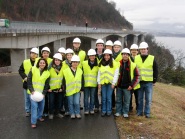Training
The overall objectives of the project are to deliver a PhD training programme that will lead to a new generation of researchers with the skill sets required to transform European infrastructure management. This will be achieved by the PhD researchers carrying out high-quality research programmes, supported by structured training modules that will equip them to understand the wide range of issues at play in managing transport infrastructure. The key mission in training the PhD researchers is to transfer tools to the researchers to allow them to significantly advance the frontiers of international knowledge through strong fundamental understanding and innovation. This will be achieved through targeted specialist training modules, while continuing to maintain sight of an industrial focus.
The research training programme will be structured to operate on a network-wide level and at a local level:
Network-wide training
A suite of clustered research projects have been selected, each offering the ESRs a PhD topic with the potential to place them at the forefront of their field. This structure allows the following opportunities:
- The TEAM ITN is running a series of postgraduate schools, one in each of the participating universities. These schools are run in the form of ‘Training weeks’ and provide training of the highest international standard and allow the TEAM ESRs to interact with fellow researchers from other backgrounds. These Training weeks involve bringing all of the TEAM ESRs together for 1 week. They are offered short-term intensive modules in core research training, as well as receiving training in other transferable skills. Four Training Weeks to be attended by all ESRs are planned throughout the project:
- Additional cluster specific Training Weeks are organised as part of the project (click here for more information).
- The postgraduate training schools are also used as an opportunity to run a series of research seminars. These seminars provide a natural framework for the ESRs to develop research communication skills.
- The PhD projects in the network feature a strong collaborative effort with a fellow network partner. This offers significant mobility opportunities and typically the ESRs spend ~20% of their time in the collaborator institution. This joint training activity takes place across the network, leading to a well integrated project team and researchers with a strong appreciation of the broad challenges faced in managing transport infrastructure.
- The acquisition of complementary skills (project management, communication, innovative thinking, business skills etc) through specific network-wide training workshops is also a goal of the network-wide training.
Local training
The TEAM ESRs carry out their research primarily at the site of one of the seven partners. This local training incorporates a number of important features, including:
- Each PhD researcher has a project supervisor who guides them in specialist matters such as the scientific state-of-the-art, key research tools, dissemination strategies to support publication in the best international journals. In addition, the supervisor liaises with fellow network partners to ensure that each postgraduate school is delivering modules appropriate to the ESRs under their supervision; these modules are offered either locally or by a partner university in the network. By combining local research expertise with appropriate modules in specialist topics, each ESRs can acquire all of the requisite skills necessary to conduct the high level research necessary to achieve their PhD.
- The TEAM ESRs are encouraged to interact with the local research group at their host. This includes research forums, national symposiums and meetings. This approach ensures the ESR achieves a true perspective of the research being conducted at the local level, and can bring this perspective when the ESR is seconded to work at the site of his/her collaborating partner. Similarly, perspectives acquired during this secondment can be brought back to the host institution and shared with fellow researchers.
- Four of the partners are located at Universities with strong post-graduate programs with modules on various topics related to managing transport infrastructure. The ESRs have access to these modules, also including modules in generic research methods, project management etc.



